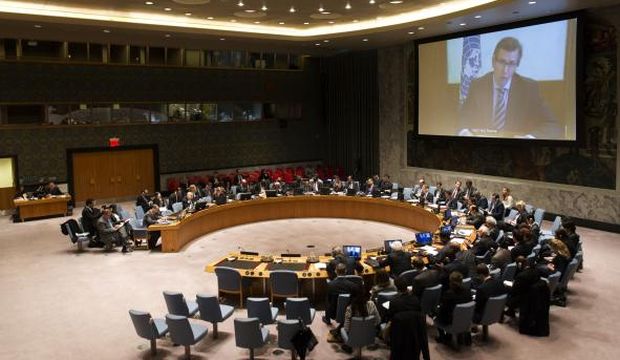
A wide view of the United Nations Security Council Chamber in New York is seen March 4, 2015 as Bernardino Léon (shown on screen), the special representative of the UN secretary-general and head of the UN Support Mission in Libya (UNSMIL), briefs the Council via video conference on the situation in that country. (AFP Photo/Handout/ United Nations/Mark Garten)
Cairo and Rabat, Asharq Al-Awsat—Libya’s permanent representative to the United Nations has accused Britain of seeking to derail efforts by the internationally recognized government in Libya to persuade the UN to lift an arms embargo preventing the country’s army from obtaining weapons.
Speaking to Asharq Al-Awsat on Saturday, Ambassador Ibrahim O. Dabbashi said Britain did “not want the Libyan army to resolve its conflict with terrorist groups and militias currently in control of Tripoli,” and accused London of playing “a very obvious” game in its efforts to block the lifting of the ban.
The internationally recognized government of the country and the Libyan National Army led by Gen. Khalifa Haftar are seeking approval by the UN Sanctions Committee to lift the embargo it imposed in 2011 during the armed uprising against longtime ruler Muammar Gaddafi.
The Tobruk government wants to purchase weapons and ammunition, including aircraft, tanks and armored personnel carriers, to help in its fight against radical Islamist militias and groups currently in control of considerable swaths of Libyan territory, as well affiliates of the Islamic State of Iraq and Syria (ISIS) in the country.
But in a letter to the Sanctions Committee obtained by the Reuters news agency, the Committee’s observers—who are tasked with monitoring violations of the embargo—said they were concerned the weapons could eventually fall into the hands of “non-state actors” such as extremist groups if the Libyan army were to lose control of its stockpiles.
Dabbashi told Asharq Al-Awsat a group of Security Council members led by Britain had persuaded the observers to write the letter, and that London and its allies were trying to cover over their “embarrassment” in dealing with the crisis in Libya.
The Sanctions Committee had previously notified Council members it would approve the request on Monday if no objections by members were raised.
The Tobruk government must now wait until Monday for the Committee to make a decision. In answer to a question from Asharq Al-Awsat on the government’s next move in the event the request is rejected, Dabbashi said only that the matter would be looked into “when the time comes.”
The Tobruk-based government is not only battling militias in the country—with the aid of Haftar’s Libyan National Army, formed out of remnants of Libya’s Gaddafi-era army—but also must contend with another, rival government based out of Tripoli.
Libyan Dawn, the main armed Islamist group in control of Tripoli, has allied itself to this rival government and its Islamist-dominated parliament, the General National Congress (GNC), which was superseded by the Tobruk government and its parliament, the House of Representatives, following elections last August.
However, the GNC said it did not recognize the legality of the elections and declared a rival government and parliament in Tripoli, where Libyan Dawn then occupied the country’s main airport before spreading out throughout the city.
Since then Libya has been plunged into turmoil, with the two governments vying for political control and violence breaking out across the country between rival militias and radical groups.
The two rival governments met in the Moroccan capital Rabat for the first time on Thursday in UN-brokered talks aimed at reaching a consensus between them on forming a national unity government.
The UN Support Mission in Libya (UNSMIL) said on Saturday talks would resume on Wednesday and said “important progress has been made so far” in the talks.
In addition to the proposed unity government, the talks also focused on “security arrangements to end the fighting” and secure the withdrawal of militias from major towns and cities, UNSMIL said.
The militias, many of which formed out of forces which participated in the uprising against Gaddafi, are also imperiling the country’s once-lucrative oil industry, attacking, occupying and in some cases sabotaging oilfields, installations and other related infrastructure.
Last week ISIS affiliates launched an attack on the Al-Gani oilfield northeast of the country, killing 11 patrol soldiers and kidnapping nine foreign workers employed by the Austrian oil services company VAOS.
Libyan army forces said on Saturday they had successfully retaken control of the oilfield once again. But on Sunday Austria’s Foreign Ministry announced it was unable to reach the nine workers who were abducted, saying there was “currently no sign of life nor proof of death,” according to the Associated Press.
Michael Linhart, a senior Foreign Ministry official, told AP on Saturday the attack was carried out by ISIS affiliates from nearby Sirte, whom he said were also responsible for the abduction and killing of 21 Egyptian Coptic Christians from the country last month.
